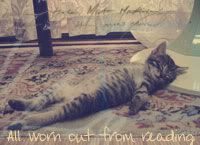What Did You Call Me?
One of C.S. Lewis's favorite forms of literary expression was the narrative poem. Yet only one of the narrative poems that he wrote was published in his lifetime: "Dymer". Following is an excerpt from "The Queen of Drum", a poem about a young queen who travels nightly (in her dreams?) to the world of Faerie.
 To the King of Drum, at last, beyond pretence
To the King of Drum, at last, beyond pretenceOf sleep, the day returned, the inevitable sense
Of well-known things around him: on the ceiling
The plaster-gilt rosettes crumbling, the lilies peeling.
Gentlement, pages, lords, and flunkey things
In lace who act the nurse to lonely kings,
Tumbled his poor old bones somehow from bed.
Swallowing their yawns, whispering with louted head,
Passed him from hand to hand, tousled and grey
And blinking like an owl surprised by day,
Rubbing his bleary eyes, muttering between dry gums
'Gi' me my teeth..dead tired...my lords--'t all comes
From living in the valley. Too much wood.
Sleep the Clock round in Drum and get no good.'
Now half they had dressed the King, half made him dress.
And day's long steeplechase one jump the less
Unrolled ahead (night's pillows and the star
Of night no more immeasurably far).
Now the long passage where the walls are thick
As in the Egyptian tombs, echoes his stick
Tapping the cold, grey floor. There, at his side,
With sharp, unlooked for sound, a door flung wide
As from impatient hands, and tall, between
The swing of the flung curtains, stepped the Queen.
--'So fast, Madam? Young limbs are supple, eh?
And easily get their rest. I'll dare to say
You have been abroad by night--not known your bed
More than an hour. Is it true?'
And when she said
Nothing at all, he tapped the ground, and nearing,Knowingly, his big grey face to hers, and peering,
Screwed home the question, snarling. And she stood
And never spoke. She too was tired, the blood
Drained from her quiet cheek. Wind-broken skies
Had havocked in her hair, and in her eyes
Printed their reckless image. Coldest grey
Those eyes, and sharp of sight from far away:
More bright a little, something steadier than
Man cares to meet with in the face of man
Or woman; alien eyes. For one unbroken
Big moment's silence, swift as rain, unspoken
Questions went to and fro, and edged replies
Flitting like motes from their embattled eyes
--(Out of the neighboring past, an unlaid fear
Signals its fellows, calls 'I am here. I am here.'
Whispers the King, "Touch not, lest it should wake
The enormous tooth that once has ceased to ache.')
'Till with a shrug, turning, he first withdrew
His gaze, yet softly breathed, 'You..Maenad, you!'
~C.S. Lewis, Narrative Poems (edited by Walter Hooper), "The Queen of Drum", 1969
__________________________________
On this day:
1944 J.R.R. Tolkien writes to his son Christopher: "She's [his daughter] just read Out of the Silent Planet and Perelandra; and with good taste preferred the latter. But she finds it hard to realize that Ransom is not meant to be a portrait of me (though as a philologist I may have some part in him, and recognize some of my opinions and ideas Lewisified in him)."




1 Comment(s):
Hello! I've just finished reading "The Queen of Drum" and am rather perplexed by the ending. Do you have any thoughts, or can you direct me to a site that analyzes the ending? Is it supposed to be left in uncertainty, or is a perceptive reader supposed to make an interpretive leap about what happens to the Queen & therefore about the value/wisdom/efficacy of following immortal longings? Thanks!
Post a Comment
<< Home